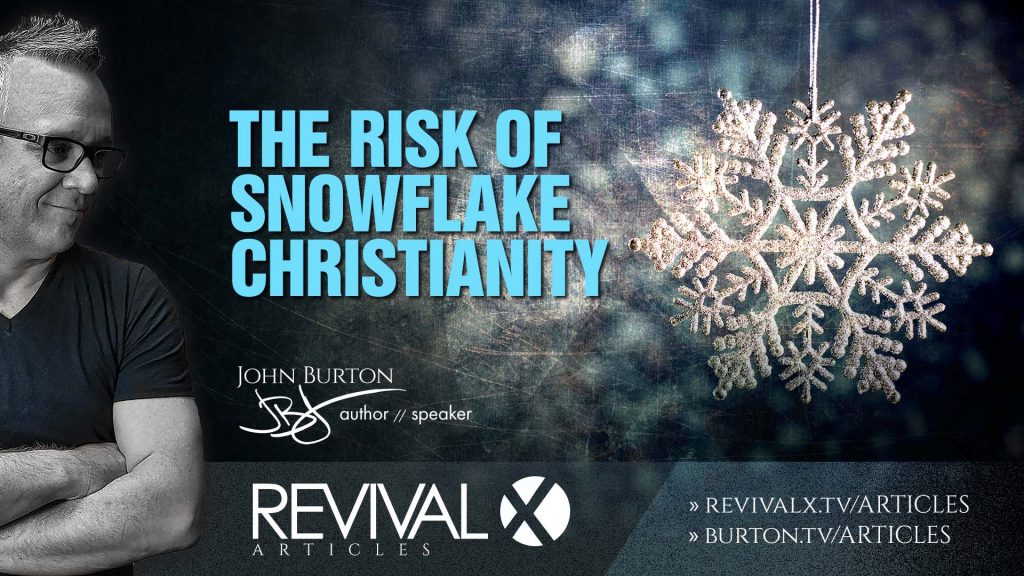The Risk of Snowflake Christianity
A refusal to wrestle with “negative” issues threatens American Christianity.
As I write, I'm looking at the stunning beauty of a winter storm from the lobby of my hotel in Denver. The individual snowflakes have banded together to create a never-ending sheet of white.
However, the fragile, melting qualities of a single snowflake have been ascribed to hyper-sensitive people, typically on the left. Ironically, the accusation fits for many of today's Believers as well.
Are American Christians Fragile?
From my article, 16 Dangers of the Positive Christianity Movement:
There is a rapidly growing aversion to any discussion about God that includes anything that feels negative. The problem? Cover to cover in Scripture we see endless accounts of God displaying His attributes—many of which would not be defined as positive.
Time and again, I've experienced conversations, sermons and viewpoints being shut down, renounced and furiously attacked by Spirit-filled Christians. The topics? Supposed negative perspectives on their pet beliefs. When their theological, political and philosophical safe places are threatened, they melt.
Many of today's American Christians are allergic to anything that puts their happy vibes at risk. The truth is their aversion to truth puts their eternities at risk.
Sin
False-grace and similar theologies have been invented to put us at ease, emphasizing the victory of the cross while ignoring the expected response of Jesus' followers. People have been so frustrated at their failure to live up to God's standards that they give up and embrace a false message. When their new paradigm is exposed as untrue, they strike back, accuse, mock or simply put their fingers in their ears. Instead of discovering the grace to live holy, they give up and give in to spiritualized poison and fight all who would attempt to help them.
Hell
For similar reasons, offense erupts when it's suggested that the road is narrow and that a small percentage of people may ultimately end up in Heaven. They have bought into a non-existent loophole that moves them closer to Universalism and further away from orthodox Christianity. The anxiety is too extreme, so they dismiss such suggestions of a wide road to hell outright. Is it possible that less than 5% of people avoid hell? Yes, it is, and we need to talk about it.
Church
Come and die. That should be the tagline of every church in the nation. Not come for the coffee. Not come for the show. Not come to find your spiritual family.
When the alarm is sounded and the call for radical surrender and consecration is blasted from the rooftops, the flakes start melting, desperate to find an environment that will satisfy and comfort. When calls to death to self are heard, fear strikes many souls.
The result? Pastors know the demands and expectations of the people very well. Many create an environment that perfectly matches what they desire. They prefer the frozen chosen to the mess of melted snowflakes all over their sanctuary.
Trump
While Christian America was celebrating in the streets and prophesying happy times as a result of Donald Trump's election, Emma Stark had quite a different take. Since we're talking about snowflakes, I'd say her perspective is a polar opposite of the jubilation expressed by most.
Emma said, “It's not always a blessing when God gives His people what they ask for and long for, according to the Bible. It can be a sign of imminent judgement and coming distress.”
She actually communicated that God would “punch Donald Trump in the face.” She said, “…He has not learnt how to redeem money, fame, sex or power. He has a preference for a different sort of Jesus to the one found in the Bible.“
The true church must arise.
My question is simple. Is there not a place to honestly discuss what Emma brings up? I'm sure most would be so deeply offended and enraged by such a “negative” word that they would scoff. They would melt. The very people who accuse the liberal left of turning to water when confronted with truth are actually doing the same.
We must not avoid the uncomfortable roundtable discussions about such topics. We have to stop shutting down sharp preaching that causes people to squirm. We must not be such political fanboys that we ignore severe, compromising issues.
The political spirit that has infiltrated the church is so fragile, though it presents as strong and bold.
It may be brash, but it's melting under the heat.

